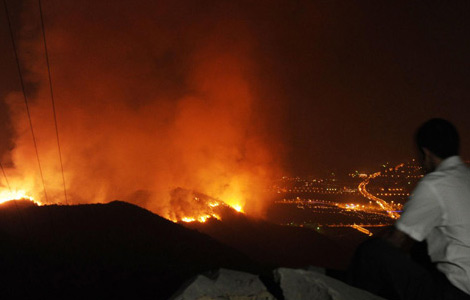UN outlines Libya's post-conflict future
Updated: 2011-08-31 08:08
(Xinhua)
|
|||||||||||
UNITED NATIONS - UN Secretary-General Ban Ki-moon and his advisor for post-conflict Libya said here Tuesday that they have plans for bringing an integrated, politically led mission to the troubled North African country, which appears to be nearing the end of a months-long conflict.
"My aim is to get UN personnel on the ground as quickly as possible, under a robust Security Council mandate," Ban told the Security Council as he delivered a briefing on the situation in Libya.
Along with Ian Martin, his special advisor on post-conflict planning, the secretary-general, in consultation with Libya's National Transitional Council (NTC), had devised a basic plan for post-conflict Libya.
According to Ban, the plan will operate under three principles, the first being Libyan ownership of the post-conflict recovery and strategizing.
"Our most important job will be to ensure that multilateral, re gional and bilateral efforts are complementary and correspond to Libyan wishes," said Ban. "In turn, this will require Libya's transitional authorities to provide clear priorities--short-term and longer-term."
He emphasized that "Libya's future is for Libyans to decide."
The second principle, Ban said, should be timely responses to requests by the Libyan authorities for assistance in tasks like restoring rule of law, strengthening institutions and civic processes, protecting human rights, and strengthening initial economic recovery.
Ban said that coordination of work -- the third principle -- is essential to successful recovery and reconstruction efforts.
"Our on-the-ground teams will work closely with the country's leadership to ensure that confusion and duplication of effort are kept to a minimum, and that time and financial resources are not wasted," the secretary-general said.
He related to the council the dire humanitarian situation that still exists in Libya, even as the rebel forces under the NTC have overrun Tripoli.
"According to our latest reports, an estimated 60 percent of Tripoli's population is without water and sanitation," said Ban. " UN Children's Fund (UNICEF) engineers are working to repair the pumping stations that conduct water from the Great Manmade River to the capital and other areas, but we do not know how long it will take to restore service. Clearly, ongoing security concerns make the situation precarious at best."
Ban added that there have been some positive developments on the humanitarian front as well. The reopening of Tripoli's seaport has allowed international humanitarian workers as well as aid and supplies into the country. Hospitals are beginning to reopen.
Speaking to reporters after the Security Council held closed consultations on Libya, Martin said that the outlook appeared good for the secretary-general's plan.
"There was a very strong endorsement in the council of the approach that was reflected in the secretary-general's statement that we are taking to plan the support of the United Nations to Libya as the conflict comes to an end," said Martin.
Martin explained that after attending the September1 meeting of the International Conference for Support of Libya, Ban will be able to present "his initial proposals for an advanced UN integrated mission to Libya" to the Security Council.
"What is very clear is a strong wish in the council but also on the part of the NTC, that the UN should play the key role in supporting overall international assistance to Libya in the phase ahead," said Martin.
Hot Topics
Li Na FIFA Novak Djokovic Liu Xiang Tiger Woods Yao Ming Rafa Nadal Ding Junhui Dirk Nowitzki Lin Dan Lionel Messi Sang Lan Maria Sharapova Wimbledon Barcelona
Editor's Picks

|

|

|

|

|

|





